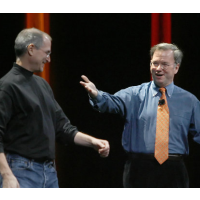Federal Judge Rejects Settlement in High-Tech Anti-Poaching Scandal
 Apple’s Steve Jobs and Google’s Eric Schmidt (photo: Tony Avelar, Agence France Presse)
Apple’s Steve Jobs and Google’s Eric Schmidt (photo: Tony Avelar, Agence France Presse)
An agreement hammered out in April between the U.S. Department of Justice (DOJ) and leading Silicon Valley companies, which paid 64,600 employees a pittance for being victims of salary collusion, was tossed out last week by U.S. District Judge Lucy H. Koh, who said the corporations conducted an “overarching conspiracy” and should really pay for it or argue their case in court.
Apple Inc., Google Inc., Intel Corp. and Adobe Systems agreed to pull $324.5 million from their combined cash reserves of $210 billion to settle a class-action lawsuit that alleged employees were ripped off for $3 billion between 2005 and 2009. They asked for triple damages.
Lucasfilm, Intuit, and Pixar were also named as defendants in the original lawsuit, but settled earlier and split the $20 million cost.
The companies were accused of maintaining “Do Not Call” lists of valued employees with instructions to recruiters not to “cold call” them. The lawsuit emerged from an investigation by the DOJ, which determined three years ago that six tech giants in Silicon Valley violated anti-trust laws. In the ensuing settlement with Apple, Google, Intel, Adobe, Intuit Inc. and Pixar Animation, the companies agreed to stop doing that—for five years.
Each employee in the lawsuit would have received around $4,000 as part of the settlement, about one-tenth of what plaintiffs argued they lost as a result of the collusion. It is unusual for a judge to toss out a settlement, but Judge Koh indicated at a hearing in June that she thought the lawyers were taking an awful lot of money (25% of the settlement) while devaluing their case.
She warned the corporations that a jury would find documents, especially those authored by Apple’s now-deceased leader Steve Jobs, to be “significant and pretty compelling.” They quote Google co-founder Sergey Brin and Chief Executive Eric Schmidt expressing fear of Jobs’ wrath. One Jobs e-mail to Brin warned, “If you hire a single one of these people, that means war.” E-mails from other participants were similarly damning.
Koh had been urged to reject the case by former Adobe computer scientist Michael Devine, who complained (pdf) that the lawyers from both sides reached the accord at a final mediation session he had been unaware of. He asked the judge, “Does this case belong to the Plaintiffs’ counsel rather than the Class?”
Devine called the settlement “grossly inadequate” and an incentive for corporations to behave badly in the future. He asked Koh, “If a shoplifter is caught on video stealing a $400 iPad from the Apple Store, would a fair and just resolution be for the shoplifter to pay Apple $40, keep the iPad, and walk away with no record or admission of wrongdoing? Of course not, nor is such a resolution appropriate in our case.”
The parties have the option of returning to negotiations first, incentivized by the treble damages that loom over a lawsuit with anti-trust implications.
–Ken Broder
To Learn More:
Judge Rejects Settlement in Hiring Suit Against Google, Apple and Intel (by David Streitfeld, New York Times)
$324.5 Million Anti-Poaching Settlement from Apple, Google Rejected (by Megan Geuss, Ars Technica)
Judge Rejects $324 Million Settlement from Apple, Google, and Others over No-Hire Scandal (by Adi Robertson, The Verge)
Judge Rejects $324.5M Settlement of Tech Wage Case (by Michael Liedtke, Associated Press)
Judge Shoots Down Settlement in Apple, Google Hiring Collusion Case (by Chris O'Brien, Los Angeles Times)
No-Poaching Collusion Cost Silicon Valley Workers Big; Deal Would Give Them a Pittance (by Ken Broder, AllGov California)
- Top Stories
- Controversies
- Where is the Money Going?
- California and the Nation
- Appointments and Resignations
- Unusual News
- Latest News
- California Forbids U.S. Immigration Agents from Pretending to be Police
- California Lawmakers Urged to Strip “Self-Dealing” Tax Board of Its Duties
- Big Oil’s Grip on California
- Santa Cruz Police See Homeland Security Betrayal in Use of Gang Roundup as Cover for Immigration Raid
- Oil Companies Face Deadline to Stop Polluting California Groundwater





